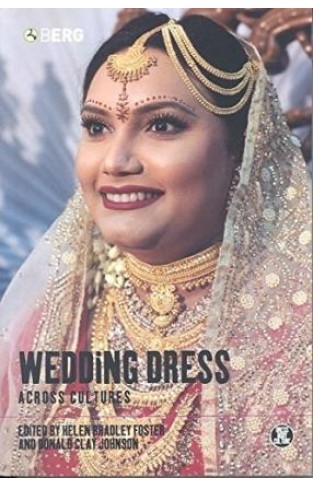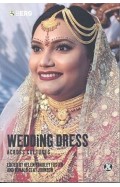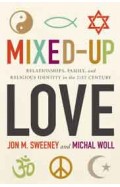- Home
- Families & Relationships
- Wedding Dress across Cultures: v. 31 (Dress, Body, Culture) Paperback – Illustrated, 1 Sept. 2003
Wedding Dress across Cultures: v. 31 (Dress, Body, Culture) Paperback – Illustrated, 1 Sept. 2003
By: Helen Bradley Foster
-
Rs 1,150.40
- Rs 2,876.00
- 60%
You save Rs 1,725.60.
Due to constant currency fluctuation, prices are subject to change with or without notice.
We're
offering a high discount on this book as it is slightly damaged
Although the Victorian white wedding dominates western bridal dress and large portions of former colonial empires, marriage rituals vary significantly throughout the world. The Japanese, for instance, combine both traditional ceremonies with receptions utilizing western approaches to dress. In the Andes the bride will personally create a multi-layered dress to showcase her weaving skills. Berber brides in Morocco wear binding clothing that covers their faces, a notable contrast to Canadian prairie-province brides whose stylized gowns individualize and enhance body shape. This engaging book examines the evolution and ritual functions of wedding attire within the context of particular cultures. It raises questions as to the relationship between contemporary wedding attire and traditional values. It discusses the changes international migrations have had upon the wedding dress of several ethnic groups. It provides insights into numerous societal relationships to weddings, such as the ban on bridal-produced embroidery in dowries in India, the challenges individual values have to larger societal ones in themed weddings, and the relationship between the return to pre-western attire and identity politics. Exploring these issues, the authors provide unusual insights into the centrality of dress in shaping individual identity as well as its importance in reflecting cultural values and ideals.
We're
offering a high discount on this book as it is slightly damaged
Although the Victorian white wedding dominates western bridal dress and large portions of former colonial empires, marriage rituals vary significantly throughout the world. The Japanese, for instance, combine both traditional ceremonies with receptions utilizing western approaches to dress. In the Andes the bride will personally create a multi-layered dress to showcase her weaving skills. Berber brides in Morocco wear binding clothing that covers their faces, a notable contrast to Canadian prairie-province brides whose stylized gowns individualize and enhance body shape. This engaging book examines the evolution and ritual functions of wedding attire within the context of particular cultures. It raises questions as to the relationship between contemporary wedding attire and traditional values. It discusses the changes international migrations have had upon the wedding dress of several ethnic groups. It provides insights into numerous societal relationships to weddings, such as the ban on bridal-produced embroidery in dowries in India, the challenges individual values have to larger societal ones in themed weddings, and the relationship between the return to pre-western attire and identity politics. Exploring these issues, the authors provide unusual insights into the centrality of dress in shaping individual identity as well as its importance in reflecting cultural values and ideals.
Wedding Dress across Cultures: v. 31 (Dress, Body, Culture) Paperback – Illustrated, 1 Sept. 2003
By: Helen Bradley Foster
Rs 1,150.40 Rs 2,876.00 Ex Tax :Rs 1,150.40
Zubin Mehta: A Musical Journey (An Authorized Biography)
By: VOID - Bakhtiar K. Dadabhoy
Rs 892.50 Rs 1,050.00 Ex Tax :Rs 892.50
How To Crack An Egg With One Hand: A Pocketbook For The New Mother
By: Francesca Beauman
Rs 3,147.50 Rs 6,295.00 Ex Tax :Rs 3,147.50
Wired For Joy: A Revolutionary Method For Creating Happiness From Within
By: Laurel Mellin
Rs 3,820.75 Rs 4,495.00 Ex Tax :Rs 3,820.75
Lovebirds How to Live with the One You Love
By: Trevor Silvester
Rs 1,270.75 Rs 1,495.00 Ex Tax :Rs 1,270.75
Love in the Time of Algorithms: What Technology Does to Meeting and Mating
By: Dan Slater
Rs 845.75 Rs 995.00 Ex Tax :Rs 845.75
Mixed Up Love Relationships Family and Religious Identity in the 21st Century
By: N/A
Rs 1,270.75 Rs 1,495.00 Ex Tax :Rs 1,270.75
The Mindfulness Colouring Book : Anti-stress Art Therapy for Busy People
By: Emma Farrarons
Rs 2,245.50 Rs 2,495.00 Ex Tax :Rs 2,245.50
No similar books from this author available at the moment.
The Witch's Boy: From the author of The Girl Who Drank the Moon
By: Kelly Barnhill
Rs 1,795.50 Rs 1,995.00 Ex Tax :Rs 1,795.50
Under the Cover of Murder: 6 (Beyond the Page Bookstore Mystery)
By: Lauren Elliott
Rs 1,483.25 Rs 1,745.00 Ex Tax :Rs 1,483.25
Fantastically Great Women Boxed Set: Gift Editions - Hardcover
By: Kate Pankhurst
Rs 5,095.75 Rs 5,995.00 Ex Tax :Rs 5,095.75
Zubin Mehta: A Musical Journey (An Authorized Biography)
By: VOID - Bakhtiar K. Dadabhoy
Rs 892.50 Rs 1,050.00 Ex Tax :Rs 892.50
Wedding Dress across Cultures: v. 31 (Dress, Body, Culture) Paperback – Illustrated, 1 Sept. 2003
By: Helen Bradley Foster
Rs 1,150.40 Rs 2,876.00 Ex Tax :Rs 1,150.40














-120x187.jpg?q6)

















